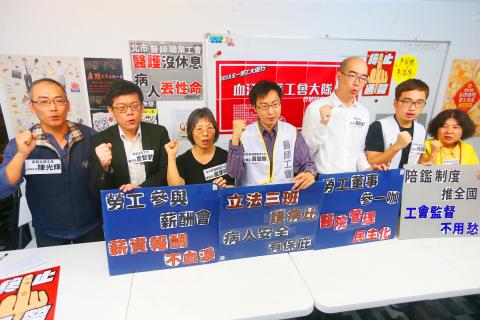Ten hospital healthcare practitioner unions yesterday said they would participate in a demonstration tomorrow, calling for amendments to be passed to improve labor conditions.
Issues such as the mass resignation of Chang Gung Memorial Hospital surgeons last year and a scandal involving the Mackay Memorial Hospital chairman earlier this year highlight the need for stricter supervision of hospital governing committees, Taipei Doctors Union president Ellery Huang (黃致翰) said.
Regulations should be amended so that hospital employee representatives can join board meetings, he said, adding that a proposed amendment to the Medical Act (醫療法), which seeks to regulate corporate hospitals’ distribution of profits, is stagnating at the Legislative Yuan, so they urge legislators to make it a priority.

Photo: CNA
Trade union members should also be invited to accompany government inspectors during labor inspections, and mandatory nurse-patient ratios should be strictly legislated and altered to suit the three work shifts, Huang added.
“A high patient-to-nurse ratio certainly affects patient safety,” Taiwan Nurses Union president Jane Lu (盧孳艷) said, adding that studies suggest that patient mortality rates increase by about 7 percent for every extra patient that a nurse must take care of.
She said after the “one fixed day off and one flexible rest day” labor policy went into effect last year, most hospitals tightened control over nurses’ working hours, but did not hire more nurses, so nurses have been forced to take care of more patients and work under extreme pressure, she said.
The regular hospital regulations only have strict rules on the patient-to-nurse ratio in emergency rooms, so the union is calling for them to be amended so that hospitals are required to be transparent about the ratio in all departments, Lu said.
Pingtung Christian Hospital Labor Union president Chan Chin-chun (詹智鈞) said that corporate hospitals’ financial statements show that most hospitals’ profits increase year after year, but the union feels that employees’ labor conditions have not improved.
The law should be amended so that hospitals have to be more transparent regarding their financial statuses, use part of their profits to improve labor conditions and allow employees to join their salary committees, he said.

Taiwanese were praised for their composure after a video filmed by Taiwanese tourists capturing the moment a magnitude 7.5 earthquake struck Japan’s Aomori Prefecture went viral on social media. The video shows a hotel room shaking violently amid Monday’s quake, with objects falling to the ground. Two Taiwanese began filming with their mobile phones, while two others held the sides of a TV to prevent it from falling. When the shaking stopped, the pair calmly took down the TV and laid it flat on a tatami mat, the video shows. The video also captured the group talking about the safety of their companions bathing

US climber Alex Honnold is to attempt to scale Taipei 101 without a rope and harness in a live Netflix special on Jan. 24, the streaming platform announced on Wednesday. Accounting for the time difference, the two-hour broadcast of Honnold’s climb, called Skyscraper Live, is to air on Jan. 23 in the US, Netflix said in a statement. Honnold, 40, was the first person ever to free solo climb the 900m El Capitan rock formation in Yosemite National Park — a feat that was recorded and later made into the 2018 documentary film Free Solo. Netflix previewed Skyscraper Live in October, after videos

Starting on Jan. 1, YouBike riders must have insurance to use the service, and a six-month trial of NT$5 coupons under certain conditions would be implemented to balance bike shortages, a joint statement from transportation departments across Taipei, New Taipei City and Taoyuan announced yesterday. The rental bike system operator said that coupons would be offered to riders to rent bikes from full stations, for riders who take out an electric-assisted bike from a full station, and for riders who return a bike to an empty station. All riders with YouBike accounts are automatically eligible for the program, and each membership account

A classified Pentagon-produced, multiyear assessment — the Overmatch brief — highlighted unreported Chinese capabilities to destroy US military assets and identified US supply chain choke points, painting a disturbing picture of waning US military might, a New York Times editorial published on Monday said. US Secretary of Defense Pete Hegseth’s comments in November last year that “we lose every time” in Pentagon-conducted war games pitting the US against China further highlighted the uncertainty about the US’ capability to intervene in the event of a Chinese invasion of Taiwan. “It shows the Pentagon’s overreliance on expensive, vulnerable weapons as adversaries field cheap, technologically